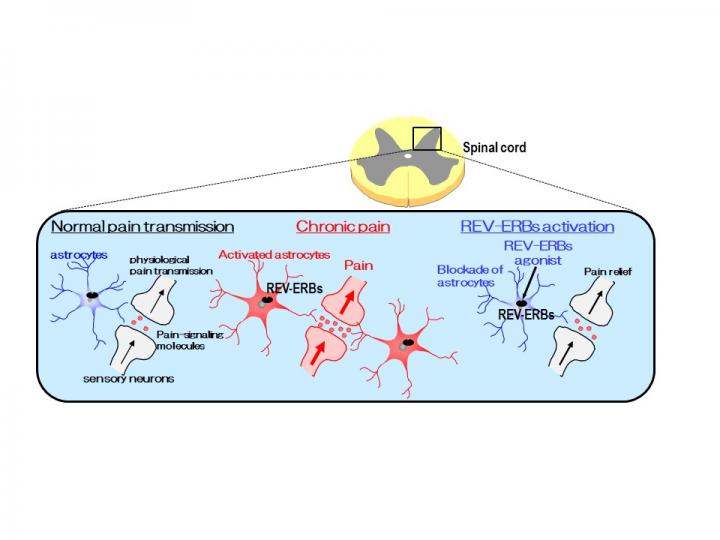Scientists observe drug target that can reduce pain when activated

Credit: Professor Morioka, Hiroshima University
A research group at Hiroshima University observed a potential new target for chronic pain treatment. Further research using this receptor could lead to new, more effective drugs to use in pain-relieving treatment for chronic pain.
Conditions that cause chronic pain can be difficult to manage. These include sciatica, cancer and rheumatoid arthritis. Chronic pain mechanisms are complicated, which is one of the reasons why pain management is so difficult, explains Professor Norimitsu Morioka of the Department of Pharmacology, Graduate School of Biomedical & Health Sciences, Hiroshima University. This difficulty decreases the quality of life of patients that, in many cases, can suffer from constant pain with little to no relief. General-purpose pain-relieving medication is often ineffective. Even morphine, possibly the best painkiller according to Assistant Professor Yoki Nakamura, also of the Department of Pharmacology, can fail to inhibit pain in cancer patients.
“Chronic pain is increasing worldwide […] associated with increasing population,” warns Morioka. The increasing number of sufferers of chronic pain means the establishment of new therapeutics is urgent, hence why the results of these types of studies can have important consequences on healthcare for these patients.
Previous research had shown that activating a type of cell receptor (REV-ERBs) that sends chemical signals inside the cell to block the production of certain genes regulates pain-causing and inflammatory molecules inside the body. Such research had shown that a molecule used to ‘turn on’ the REV-ERBs had decreased the production of inflammatory molecules in immune cells but
“Nobody checked the effect of REV-ERBs agonist [stimulator] on nociceptive behaviors [pain reactions] or chronic pain so first we checked the effect of REV-ERBs agonist on chronic pain,” explains Nakamura.
Until now, research has also only looked into one type of pain model at a time. Morioka elaborates that
“I think it is not enough to reduce by one target […] I think it is important to cover a lot of molecules mediating chronic pain,” and REV-ERBs seems to be a fitting target “So it is very exciting.”
The research group applied this knowledge to determine if activating the nuclear receptor REV-ERBs in specialized spinal cord cells (astrocytes) results in pain relief in mice. The team treated mice with differing levels of pain sensitivity with molecules that turned on REV-ERBs. The molecules studied can be easily found in today’s pain-relieving drugs according to the team. To test whether there was a notable effect on pain; mice were touched with a filament on their hind paw. Pain was recorded when mice raised their paw away from the filament. Light touches made mice with chronic pain react whereas ‘normal’ mice only moved when the force was increased. Mice with chronic pain when treated with a REV-ERBs stimulator did not react to the lighter touches (depending on the type of chronic pain they had). Through these observations, the research group concluded they did not feel as much pain as the untreated mice with the same type of chronic pain.
Based on these results, the researchers believe that this new target for pain relief could benefit many types of chronic pain sufferers. They plan to perform further research and drug screening experiments to develop new drugs for various types of chronic pain relief.
###
Media Contact
Norifumi Miyokawa
[email protected]
Related Journal Article
http://dx.




